![]()
Wed, Oct 10, 2012 | By Halil M. Karaveli
This article was first published in the Turkey Analyst, vol. 5 no. 19 (www.turkeyanalyst.org), a biweekly publication of the Central Asia-Caucasus Institute & Silk Road Studies Program Joint Center. © Central Asia-Caucasus Institute & Silk Road Studies Program Joint Center, 2012.
The Turkish government appears to hope to deter the continued Syrian — and Iranian — deployment of the Kurdish card against Turkey. But it is questionable whether Turkey will succeed in deterring Damascus and Tehran since it is all too obvious that Ankara does not really want to go to war. Ankara would be well advised to change course, exploring the possibility of a truce with Damascus, with the two neighbors agreeing on a reciprocal cessation of support to their respective insurgencies.
Background
On October 4, the Turkish parliament approved a bill that authorizes the use of military force against “foreign countries”, after a mortar fired from Syria killed five civilians in the Turkish border town Akçakale. Since then, Turkish artillery has been returning fire, and the Turkish military build-up along the border with Syria continues; Turkish navy ships have left their base in Gölcük in the Marmara Sea, having reportedly set course toward the eastern Mediterranean. General Necdet Özel, the Turkish chief of the General staff, has been touring the border region since the decision in parliament together with the army chief, making public appearances meant to signal Turkish strength and determination to act against Syria. Representatives of the ruling Justice and Development Party (AKP) have made equally bellicose statements that convey the impression that Turkey is about to invade Syria.
Prime Minister Recep Tayyip Erdoğan warned Damascus on October 5 that Ankara is prepared for war. “We are not war-lovers, but neither are we far from war,” Erdogan said. Egemen Bağış, the cabinet minister for EU affairs, assured that “We can destroy Syria in one hour”; Şamil Tayyar, an AKP member of parliament, followed suit, predicting that Turkey will reach Damascus “within three hours”. Foreign minister Ahmet Davutoğlu, meanwhile, was more cautious, saying that the parliamentary authorization was designed as a deterrent. “We haven’t taken this step with the intention of going to war”, he assured. Beşir Atalay, a deputy prime minister, similarly stated that Turkey did not intend to declare war on Syria, only to deter it.
However, Turkey is in fact already at war — albeit an undeclared one — with Syria, since Ankara is actively supporting the rebels who are trying to bring down the regime in Damascus. Turkey has helped to arm the rebels, allowed them to use Turkey as a base, and to freely cross the Turkish-Syrian border. Thanks to this support, the rebels have succeeded in gaining control over parts of the areas of Syria that border Turkey; as a consequence, Turkish towns along the border have become exposed when the Syrian artillery engages the rebels.
Yet the bellicose statements of Erdoğan and other government representatives notwithstanding, an invasion of Syria is not something that Turkey wants to embark on unilaterally, without the support of its Western allies. That is why Erdoğan is displeased with the United States’ reluctance to take decisive action against the Syrian regime. Interviewed by CNN on September 5, the Turkish prime minister chided the Obama administration for lacking initiative on Syria. The Turkish army may indeed reach Damascus within three hours, but the aftermath, the specter of becoming bogged down in the quagmire in Syria is certainly not something that appeals to the decision makers in Ankara, however adventurous the Turkish government may have become in its foreign policy since it decided to embark on the endeavor to bring about regime change in Syria.
Neither does the Turkish public clamor for war against Syria; the Syrian regime change policy of the Turkish government is on the contrary opposed by a clear majority of the population of Turkey. According to the latest poll, only 28 percent approve the government’s Syria policy. A vast majority, 76 percent, oppose Turkish unilateral intervention in Syria; only 17 percent support Turkish military action against the Syrian regime, while a military operation against Syria together with NATO is approved by 31 percent.
Implications
Turkey has had to resort to military deterrence because its gamble in Syria has not paid off. Soon after the uprising against President Bashar al-Assad began, the Turkish government, which until then had nurtured a close partnership with the Syrian regime, gambled that what awaited al-Assad was a fate similar to the one that befell Qaddafi in Libya — another former friend of Erdoğan. Not wanting to lose initiative to others, as had been the case in Libya, Turkey abandoned its erstwhile friend in Damascus and adopted the cause of the Sunni rebels that it assumed were about to ascend to power; assuming that the Muslim Brotherhood — an ideological kin to the AKP — was going to be the new ruler of Syria, the Turkish ruling party saw a new opportunity arise to expand its regional influence, this time by playing a sectarian card. However, positioning itself as an interventionist Sunni power, Turkey has shouldered a sectarian cause not only in Syria but also in Iraq, where it is in confrontation with the Shiite regime. Thus, this move has come at an unexpectedly heavy prize for Ankara.
Turkey had sought to establish itself as the preeminent power in the Middle East by having “zero problems” with all of its neighbors; this non-ideological, soft power approach has by now been thoroughly abandoned. Turkey aspires, in the words of foreign minister Davutoğlu, to be the master of the new Middle East; but it relies increasingly less on the tools of soft power — trade and things like the impact of Turkish television shows — and all the more on hard power in the form of arms supplies and military deterrence. But Turkey’s means are far from matching its ambitions; in fact, its attempt to redesign its neighborhood, its commitment to bring about regime change in Syria, has exposed its internal vulnerabilities, which are being exploited by those powers that it has challenged.
The Syrian regime has not only survived far longer than Ankara had calculated; it has — together with Iran, its leading supporter — turned the table on Turkey. Bashar al-Assad has allowed the Kurds in northern Syria to establish self-governing entities, while Iran is suspected of lending crucial support to the Kurdish insurgency in Turkey. The militants of the Kurdistan Workers’ Party (PKK) have staged numerous attacks against the Turkish army in the southeast of the country since summer and they have carried out a deadly terrorist attack in the city of Gaziantep which could be a harbinger of things to come. Turkish government representatives have accused Iran of being behind the surge in PKK attacks, and the Iranian chief of the General staff has indeed stated that Turkey should expect internal troubles as a consequence of its meddling in Syria.
It is against this background that Turkey is threatening Syria with open war. What the Turkish government hopes to deter is continued Syrian — and Iranian — deployment of the Kurdish card against Turkey. The establishment of an embryonic, autonomous Kurdish entity in Syria is an unacceptable development for Ankara that fears the effect this will have on the Kurds across the border in Turkey; in fact, Erdoğan has stated that Turkey will take military action if the Syrian Kurds make moves toward autonomy. And the attacks of the PKK risk undermining Turkey’s stability, and hence pose a potential threat to Erdoğan’s power.
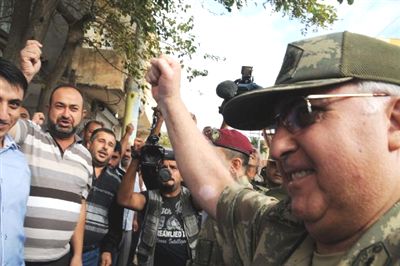
Responding to locals’ cheers, Özel raises his fist, saying: ‘We are here and we are standing tall.’ Özel says Turkey will show a a tougher response if the shelling continues. (Hurriyet Daily News/DHA photo)
Conclusions
What was an enticing prospect — a Syria where an ideological ally of the AKP, the Muslim Brotherhood would ascend to power — has turned into a security nightmare for Turkey whose internal vulnerabilities are being exploited in retaliation. But it is questionable whether Turkey will succeed in deterring Damascus and Tehran, since it is all too obvious that Ankara does not really want to go to war.
But even in that case, it is likely that the Kurdish problem, which Turkey hopes to deter Syria and its backers from exploiting, will become even more intractable. The effects of a regional conflagration that risks following on a Turkish invasion of Syria are bound to be anything but stabilizing. As neither military deterrence nor war is likely to remove the threat to Turkey’s security and territorial integrity, Ankara would be well advised to explore the possibility of a truce with Damascus, with the two neighbors agreeing on a reciprocal cessation of support to their respective insurgencies. Indeed, an influential Turkish, pro-government strategist, Sedat Laçiner, proposes that Turkey should not hesitate to talk with anyone in Syria — including with Bashar al-Assad — in order to neutralize the threat to its national security.
Although that must be deemed an unlikely development, it is nonetheless notable that foreign minister Davutoğlu said last week that Syria’s vice president Farouk al-Sharaa would be acceptable as the leader of a transitional government; the idea was rejected by the Syrian rebels, but it suggests that the Turkish government is scrambling to find a way out of its dilemma — between continued support to the rebels who are not set to bring down al-Assad anytime soon, which leaves Turkey exposed to further retaliation, and an outright invasion of Syria which would almost certainly only aggravate Turkey’s security situation.
The last time Turkey threatened Syria with war was in 1998, when Ankara demanded that Damascus expel Abdullah Öcalan, the leader of the PKK. Damascus complied, and Öcalan shortly thereafter ended up in the prison in Turkey where he remains to this day. But the Kurdish problem did not disappear, far from it, and neither will it this time around only because Turkey is threatening Syria. The simple truth revealed by Turkey’s involvement in the Syrian crisis is that the country that aspires to be the “master of the Middle East” is internally too weak and vulnerable to sustain such ambitions of grandeur.
Halil M. Karaveli is Senior Fellow with the the Central Asia-Caucasus Institute & Silk Road Studies Program Joint Center and the Managing Editor of the Turkey Analyst.



 RSS
RSS

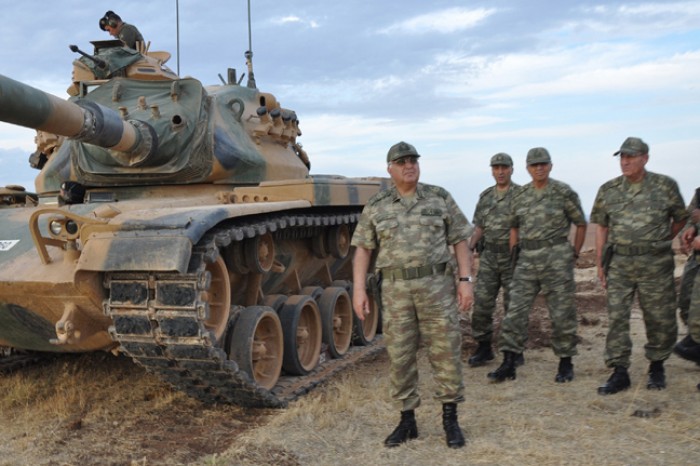


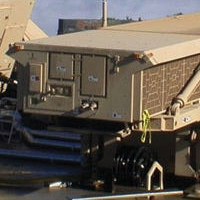
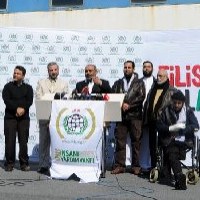
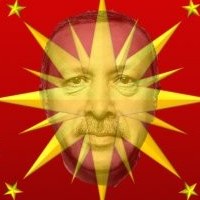





Latest Comments
... [Trackback] [...] Read More: crethiplethi.com/contact-form/trackback/ [...]...
Hello Mike, Thank you for your positive feedback to the article. I felt there wasn’t too much critical analysis of ...
Thanks for this considered and well constructed article. A follow up article on the manner in which the editorial contro...
THE CLUELESSNESS OF CLAIMING THAT OBAMA'S MIDDLE EAST POLICIES WERE A FAILURE CANNOT BE FURTHER FROM THE TRUTH, WHAT THE...
As long as Obama is the president of the usa do not trust the us government......